What is an Electoral System?
At its basic understanding an electoral system is a set of rules that is used to determine how the choice of a president or a political party is conducted and how the results are counted. Voting structure takes into consideration several necessary details, such as the age of voters, time and place of the elections, and financial limits on campaign spending when creating the best environment for making decisions. At the same time, while electoral system is a complex and detailed procedure, it is organized by every government individually. For instance, the U.S. has a unique practice of electing authoritative figures that includes a large number of necessary elements. Therefore, the following presentation will provide an in-depth understanding of the U.S. electoral system by discussing its distinguishing features and processes.
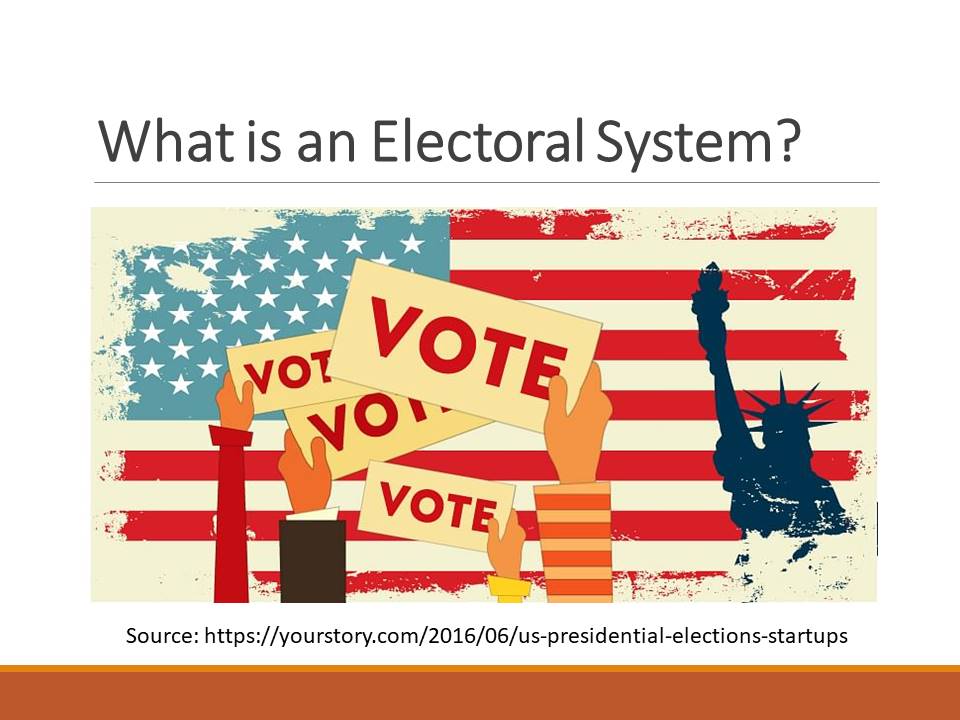
The Electoral College
- A body consisting of 538 electors.
- A sum of electors differs by state.
- Election of the president and vice president .
- 270 electoral votes – a winning number.
In general, the voting organization in the U.S. can be described by the term Electoral College. This phrase describes a body of electors that is appointed by every state for the purpose of choosing the president and the vice president of the U.S. After completing the process of general election by the citizens, the candidate who receives a preference of the majority gains all the votes from the electors of this state (Bugh, 2016). To win the desired position, the applicant needs to get at least 270 votes from all electors (Bugh, 2016). Thus, the procedure does not end with the choice of residents; it continues with electoral votes.
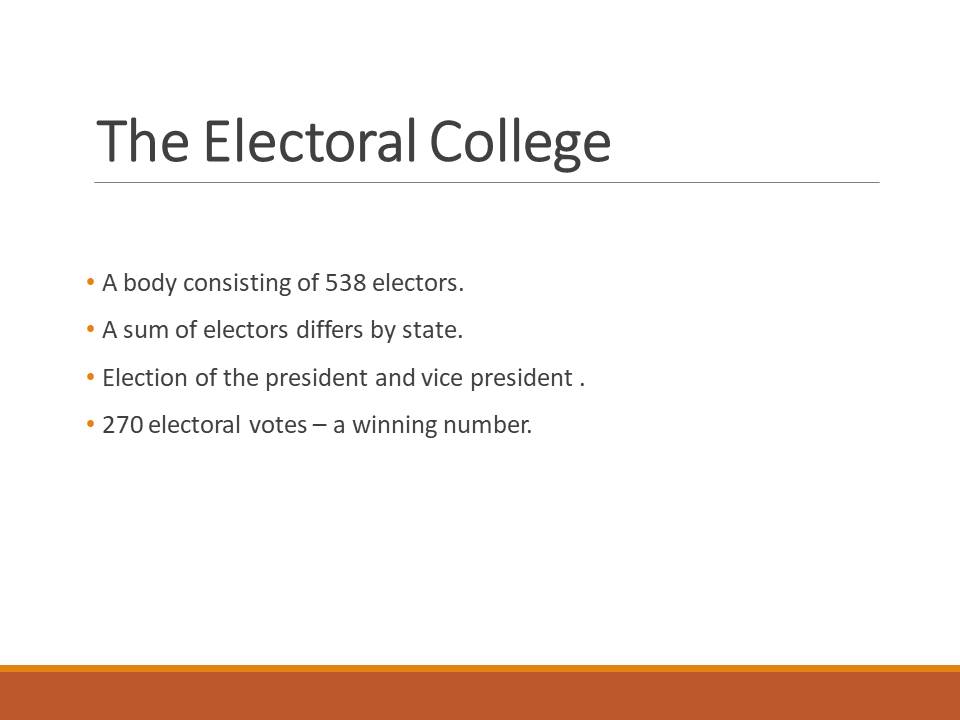
The Purpose of Political Parties
- Broadening of the rights of voters.
- Extending political rights to all layers of the society.
- Eliminating voting restrictions.
- Increasing the level of democracy in the country.
In addition to the Electoral College, there are several other elements highly involved in the voting system of the country and one of them is a role of political parties. First and foremost, it is necessary to mention that the U.S. was the first country in the world to create a program that would transfer the executive power from one party to another through an election (Bugh, 2016). Political parties proved to be essential in expanding the political rights of individuals and eliminating the restrictions on voting (Bugh, 2016). Hence, the main purpose of political parties in the U.S. is the expansion of democracy and freedoms of the population.
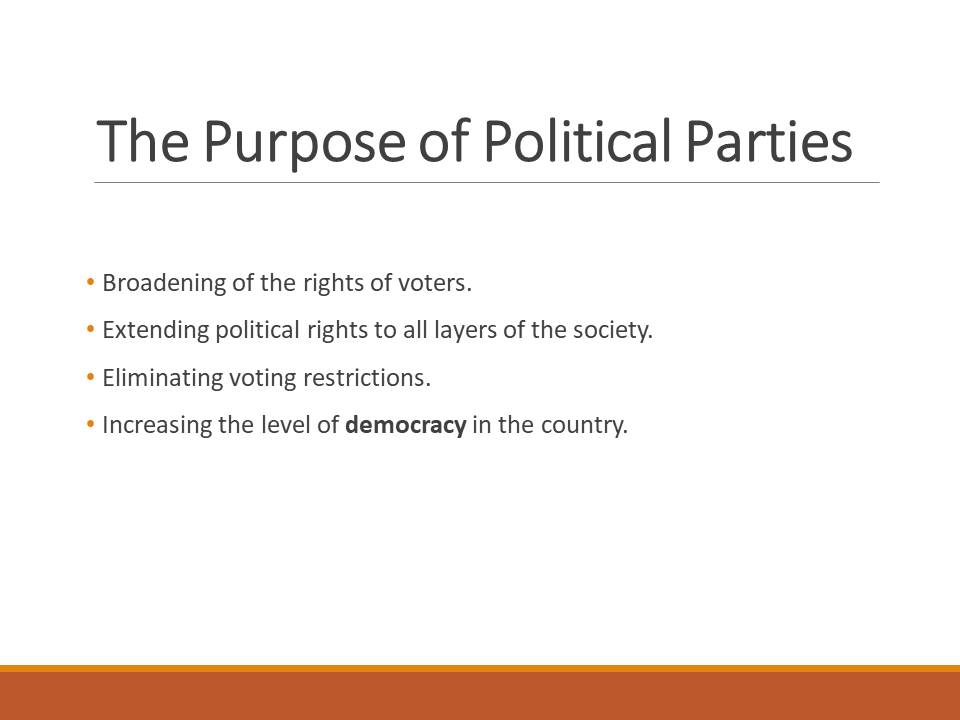
The 2 Parties and Their Function
- Two major parties: the Republican and the Democratic.
- Control of the president, the Congress, and the legislatures.
- Two-party system – a vital element of American politics.
Nowadays, the two dominating political groups in the U.S. are the Republican and the Democratic parties. They both have the power to control the Congress, the presidency, and the legislative government of the state (Bugh, 2016). For instance, since 1852 every president of the U.S. was either a Republican or a Democrat (Bugh, 2016). Various third parties exist in the country, however, they do not get as much popularity and recognition. For this reason, it can be concluded that the two-party system controls the electoral politics and operates as a critical aspect for the American political system.
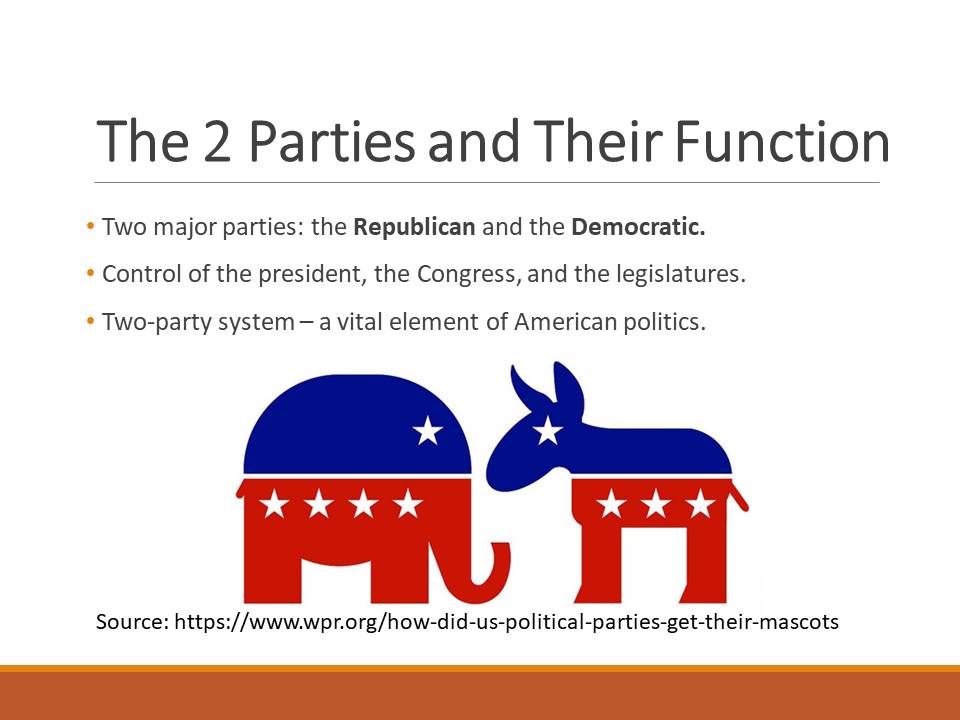
Citizens’ Role in the Process
- Choosing the best candidate through a participation in elections.
- Trusting an individual to represent the desires of the population.
The population of the U.S. is obviously an essential part of the electoral system since people are the ones who desire to live in an improved environment and, consequently, make vital decisions. One of the most obvious ways through which the citizens of the U.S. can take part in the process of elections is voting. By choosing particular candidates for the position, people give them their trust to represent their ideas and opinions in front of the whole world. Therefore, individuals need to remember that their vote matters and has a contribution to the outcome of the elections.
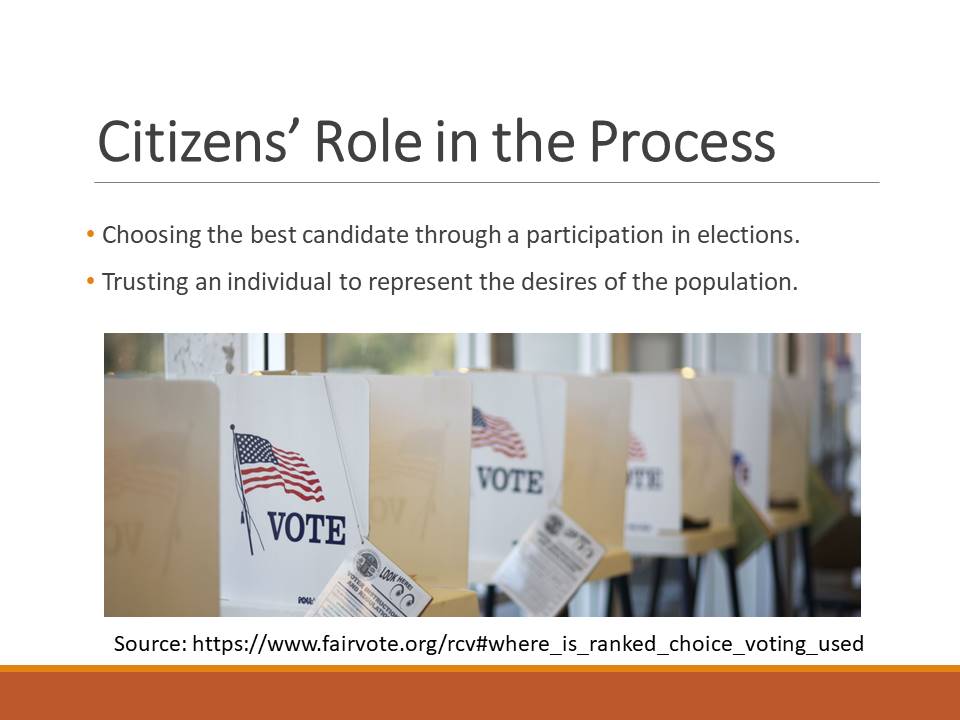
Other Ways of Participation
- Working in political campaigns.
- Engaging in discussions.
- Raising awareness about the current issues.
- Joining pressure and interest groups.
Even though taking part in the voting process is the most effective way to be involved in the elections, there are many other means of individual participation. Some U.S. citizens voluntarily choose to engage in political campaigns of different candidates by advertising them to their local communities (Bugh, 2016). Others decide to take part in the procedure by raising awareness about various issues that exist in modern American society (Bugh, 2016). Finally, a possible way of contributing to the elections is joining an interest group where people share similar opinions and concerns (Bugh, 2016). Thus, there are several opportunities for individual involvement, and citizens should take advantage of them.
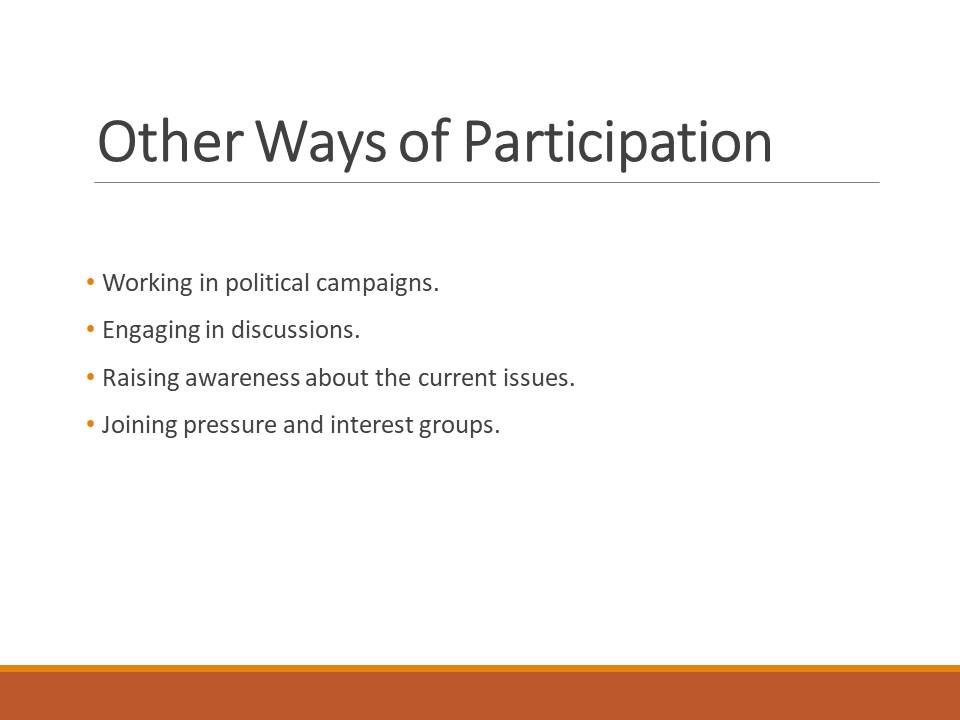
Caucuses vs. Primary Elections
Primaries
- Similar to general elections.
- An individual choice on a secret ballot.
- A person with the biggest number of votes is the winner.
When the Republican and the Democratic parties organize the process of nominating the best candidates, which happens months before the actual election, they select applicants by using two different methods: caucuses and primary elections. A primary is a way to choose a candidate that is similar to the general election (“Primaries and caucuses,” n.d.). It is organized on the statewide level, and individuals can make their choice by putting a mark on a secret ballot (“Primaries and caucuses,” n.d.). Consequently, whoever receives the most significant number of votes is the winner of a primary election. In presidential primary, the successor is then given “a majority number of the state’s delegates to the nominating convention” (“Primaries and caucuses,” n.d.).
Caucuses
- Organized by political parties themselves.
- Meetings of different groups of citizens.
- Collective discussions of candidates.
Caucus, in comparison to a primary, is an entirely different practice. Caucuses are special meetings organized by the members of a political party where they collectively discuss the applicants and decide on the best candidate for the position. (“Primaries and caucuses,” n.d.). At the end of the gathering, there is an election that decides on the delegates who will represent a candidate from the majority (“Primaries and caucuses,” n.d.). These delegates then decide on the ambassadors to the national convention who, eventually, choose a figure to run the office (“Primaries and caucuses,” n.d.). Thus, while a primary election is an individual process, caucus focuses on gathering and discussing similar opinions about the candidates.
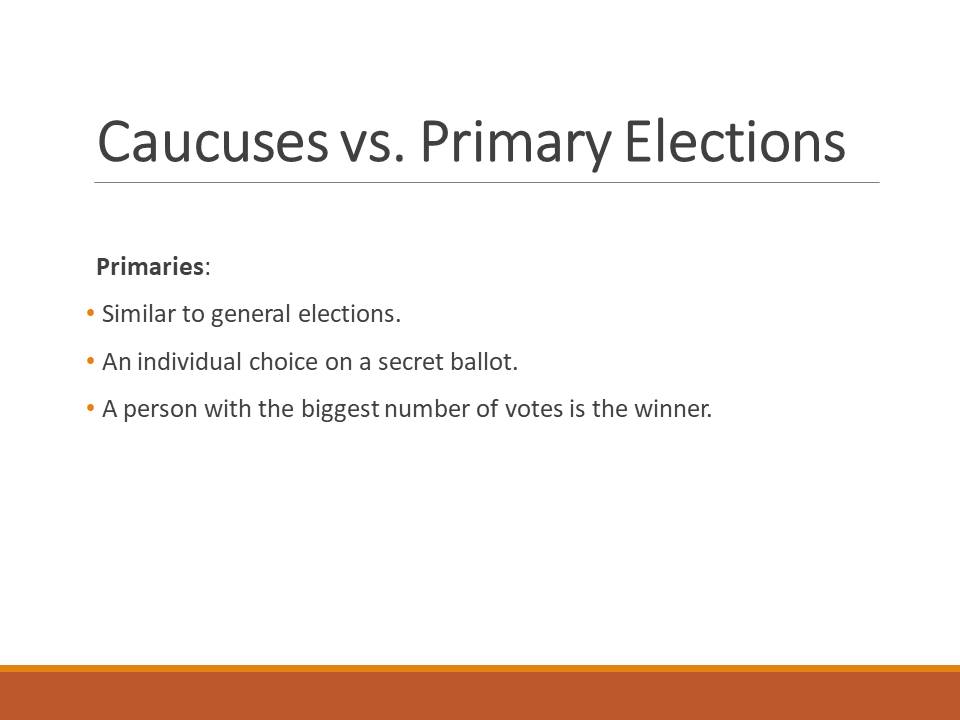
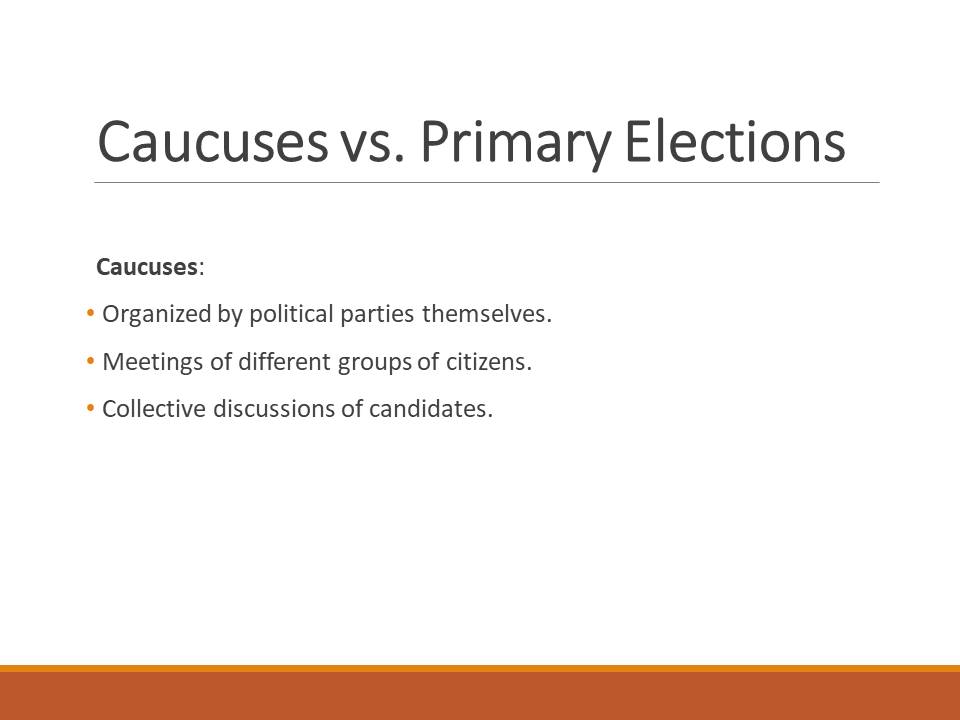
The Role of Caucuses and Primary Elections
After learning more about each of the methods and watching a video about them, it becomes clear that they carry a specific purpose in the presidential election process. In general, through the implementation of these practices, the Republican and the Democratic parties decide on their best candidates for the representation during the elections. While caucuses engage individuals in discussions and debates, primaries give a chance to express personal opinion anonymously. Furthermore, these two types of elections ensure that the two-party system dominates and will continue to be prevalent in U.S. politics. This is because primaries and caucuses limit the choice of voters during the general election, and the elected president is either a Democrat or a Republican. Therefore, the two methods are essential for the already established political system.
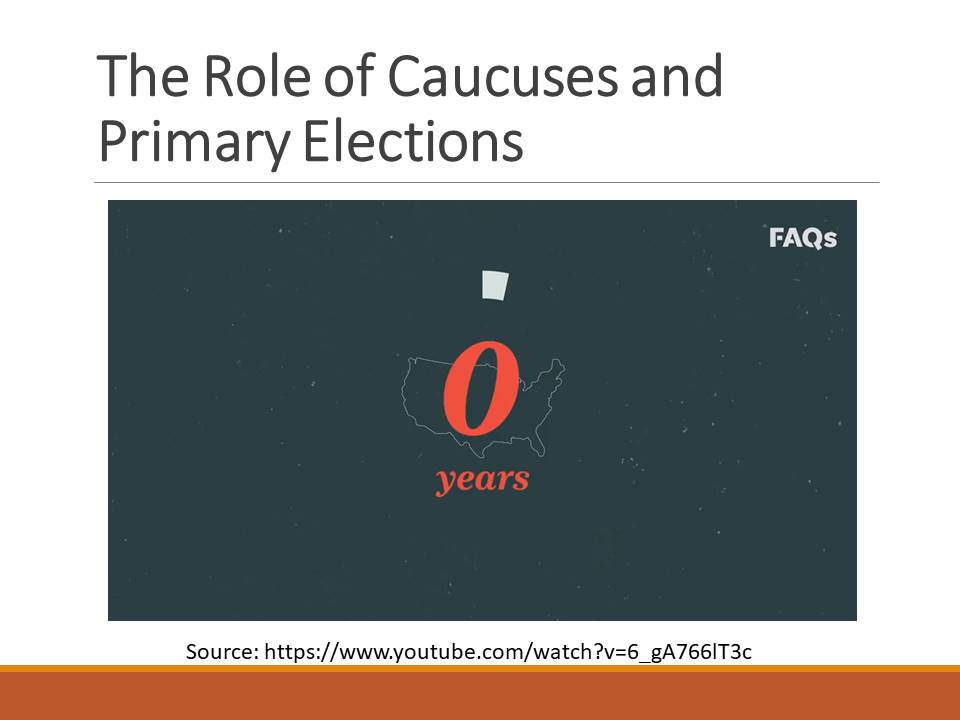
National Conventions
- An official meeting of delegates.
- Nominating the candidates.
- Deciding on the principles and goals of the party.
- Adopting the rules for party activities.
After completing the selection of candidates through primaries and caucuses, political parties hold national conventions. The participation in the assembly is set by each party individually; therefore, the number of voting representatives is different (Bugh, 2016). National conventions are the meetings organized in order to nominate the candidates for the position of the president and the vice president of the U.S. (Bugh, 2016). In addition, these practices aim at formally deciding on the primary principles and goals of the party and stating the main rules for their operations (Bugh, 2016). Generally, national conventions finalize the most vital decisions of the party.
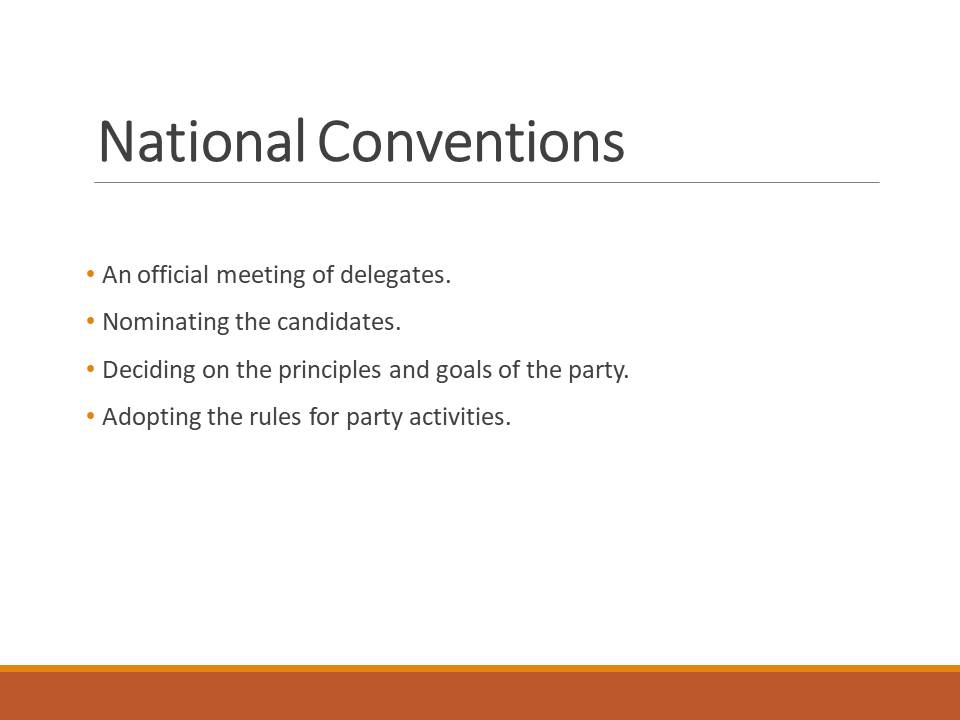
The Modern Purposes of Conventions
- To sell rather than select.
- To introduce an individual and their program.
- To communicate with the voters in an unmediated way.
- To influence people’s decision-making process.
Even though the formal meaning of a national convention is to nominate the candidates, it can be stated that, nowadays, the purpose has slightly changed. Berman (2016) suggested that “the conventions are organized to sell, rather than select, the politicians who rank-and-file voters chose at the polls” (para. 2). Assemblies offer nominees an opportunity to introduce themselves and their program to voters and possibly influence their decision about the future president (Berman, 2016). The acceptance speech presented by the applicants is a unique way to communicate with the population in an unmediated way (Berman, 2016). The convention sets a narrative which is then associated with a particular candidate.
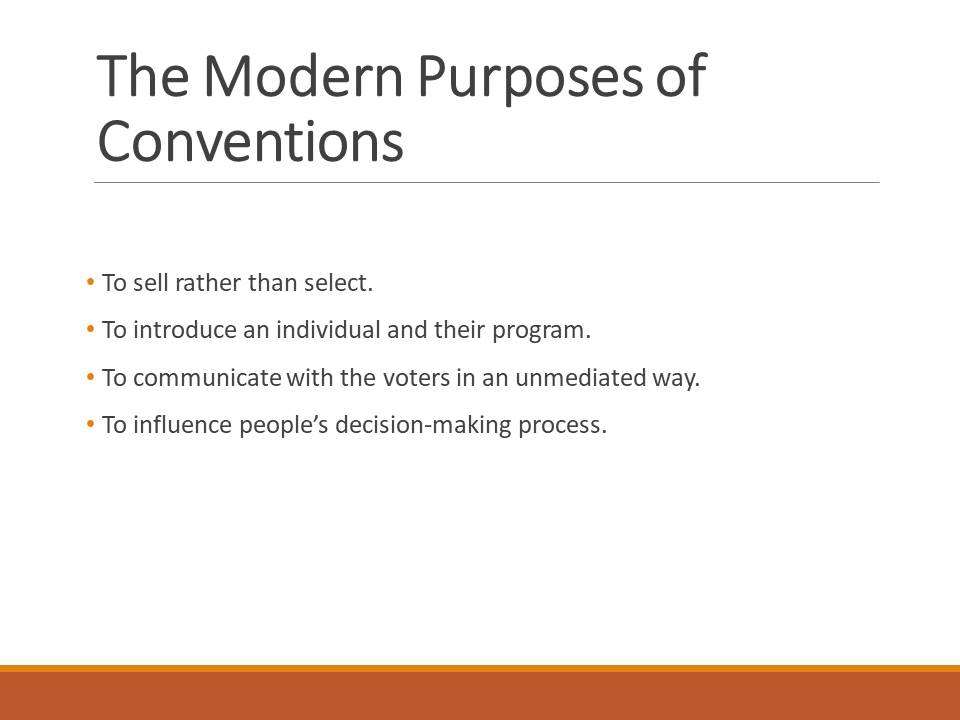
The General Election Campaign
- The Electoral College system influences campaigns.
- Targeting states with the most electors.
- Ensuring a favorable position in California, Texas, New York, Florida.
- Driven by media such as, television and the Internet.
- Focused on a favorable representation of the candidate.
- Debates – a vital campaign element.
- Television debates attract the attention of U.S. citizens.
Once the nominees are known to the general public, the official process of a general election campaign starts. Since the U.S. political system is established around the Electoral College concept, candidates focus their attention on targeting states with the largest number of electors (Bugh, 2016). By investing funds into such states as, for instance, California and Texas, individuals hope to ensure their dominating position in the eyes of Americans (Bugh, 2016). Therefore, instead of putting energy into the development of a campaign that would interest the whole country, candidates create programs suitable for specific states with the biggest number of electoral votes.
Contemporary presidential campaigns are driven by media since it is the most critical means of receiving information and learning more about various events happening in the country. For this reason, candidates spend millions of dollars on advertising and community meetings to generate a positive media representation. One of the most popular campaign processes is the debates between the Republican and the Democratic presidential candidates (Bugh, 2016). Since 1976, debates are a vital element of the election process which attract the attention of millions of individuals in the U.S. (Bugh, 2016). Debates are presented on television channels which gives everyone an opportunity to watch and analyze them.
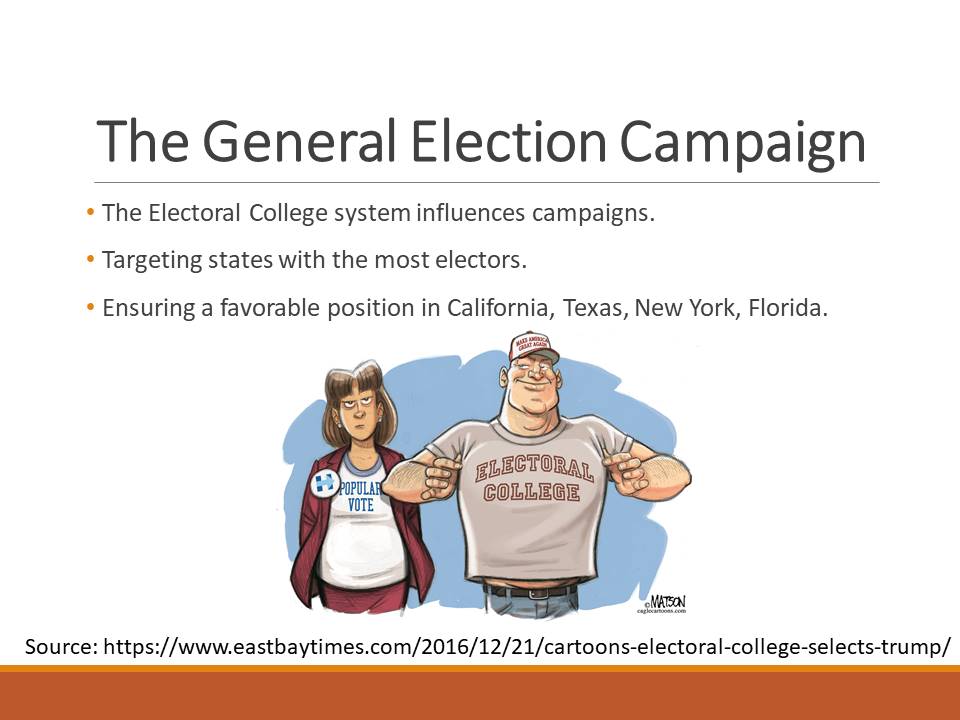
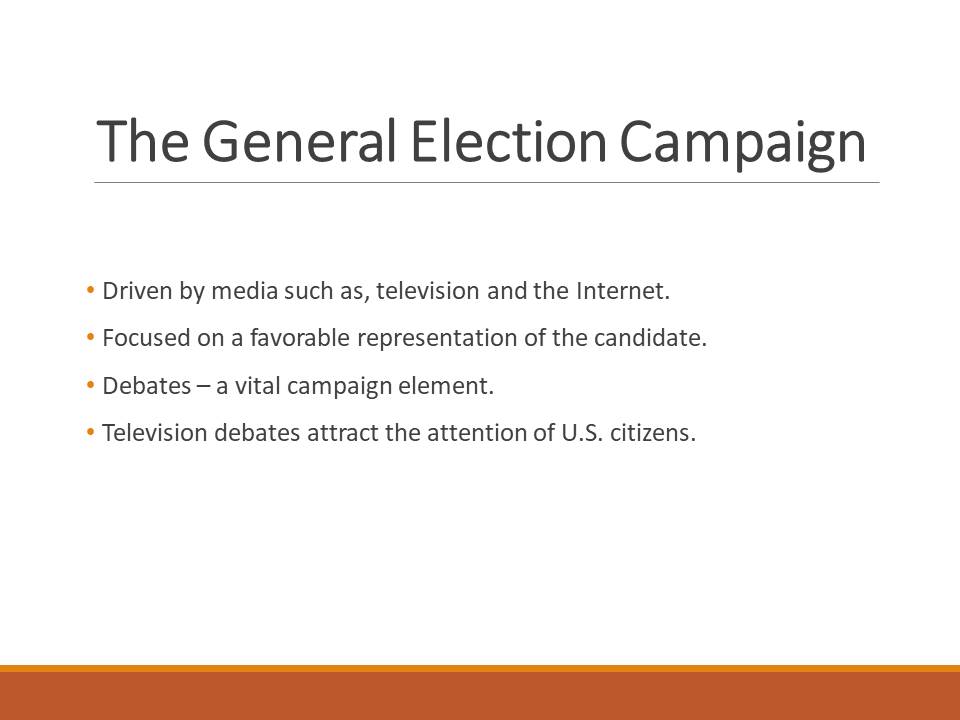
The Influence of Debates
- Candidates’ discussions are closely analyzed in the media.
- Result in a shift of public opinion.
- A more prepared and confident candidate is in favor.
- Can change individuals’ choice of the president.
While presidential debates are an essential component of candidates’ campaigns, they can have a massive influence on the election process. Discussions between the representatives of each party are carefully analyzed by knowledgeable individuals on different media platforms (Bugh, 2016). These critiques sometimes result in a shift of general opinion about this or that individual and, eventually, affect people’s choice of the president (Bugh, 2016). For this reason, candidates need to take into consideration all the possible outcomes of the debates and be prepared to answer any question or provide a comment for different controversial arguments.
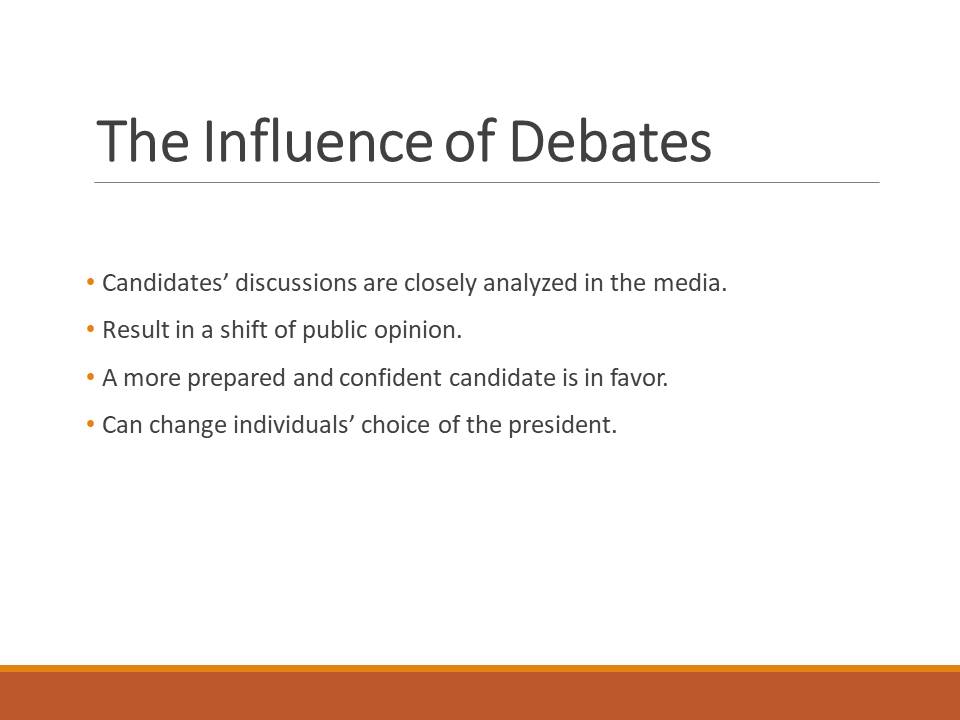
The Role of Media
- Helps to create a positive image.
- Develops bias and fraud.
- Journalists decide who to cover according to their personal choice.
- Some candidates are left invisible.
- People do not know enough about each applicant.
- Only energetic, scandalous, and revolutionary people are discussed.
- The information is filtered according to likes and follows.
- An exposure to a limited spectrum of opinions.
- Direct access to candidate profiles and opinions.
- An establishment of a strong personal connection.
As it has already been mentioned, modern political campaigns are established around the media. In order to make an important decision, voters are in need of sustainable knowledge about the benefits that a particular person can bring to their life. Thus, candidates invest significant funds and personal effort in creating a positive image of themselves on various social media platforms, radio, and television. For instance, media representation includes various video advertisements on Instagram, Facebook, and Twitter created to target the youngest population of the voters. Television and radio advertisements are developed for a slightly older part of the American population. However, in addition to positively portraying the candidate, the media can contribute to the emergence of bias, fraud, and fake news.
Some individuals can be left out of the media by journalists and political experts. This tendency exists because authoritative figures in the sphere of politics decide who to cover, favor, and criticize individually (Brichacek, n.d.). It is in their personal choice which candidates to analyze and how much and, as indicated by Brichacek (n.d.), these decisions alone can have a massive influence on the outcome of elections. For instance, some people can be left invisible for the general public because their personalities are not as scandalous as the characters of others, or their programs are not distinct enough.
Another tendency created by the media is the fact that the information the audience receives is filtered. What people see on their social media platforms is based on their preferences according to likes, follows, and comments (Brichacek, n.d.). Hence, instead of accepting a diversity of opinions, individuals are exposed to filtered reports based on their own choices (Brichacek, n.d.). Nevertheless, social media gives users a chance to get direct access to candidates’ lives, views, and opinions (Brichacek, n.d.). Through media, people can establish an intimate relationship with a person that they have never met before.
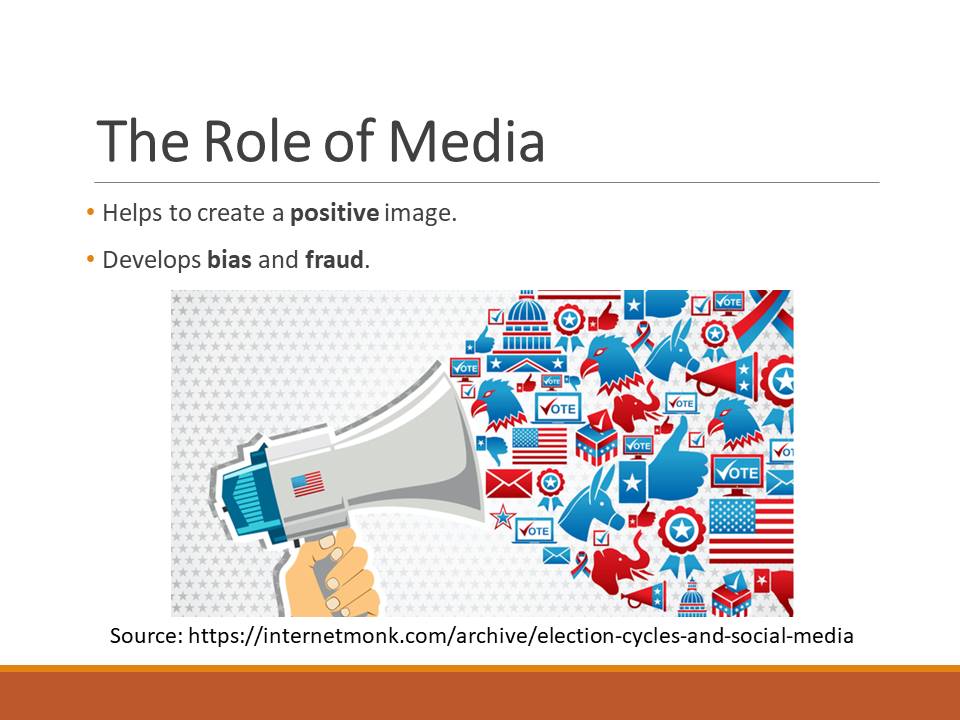
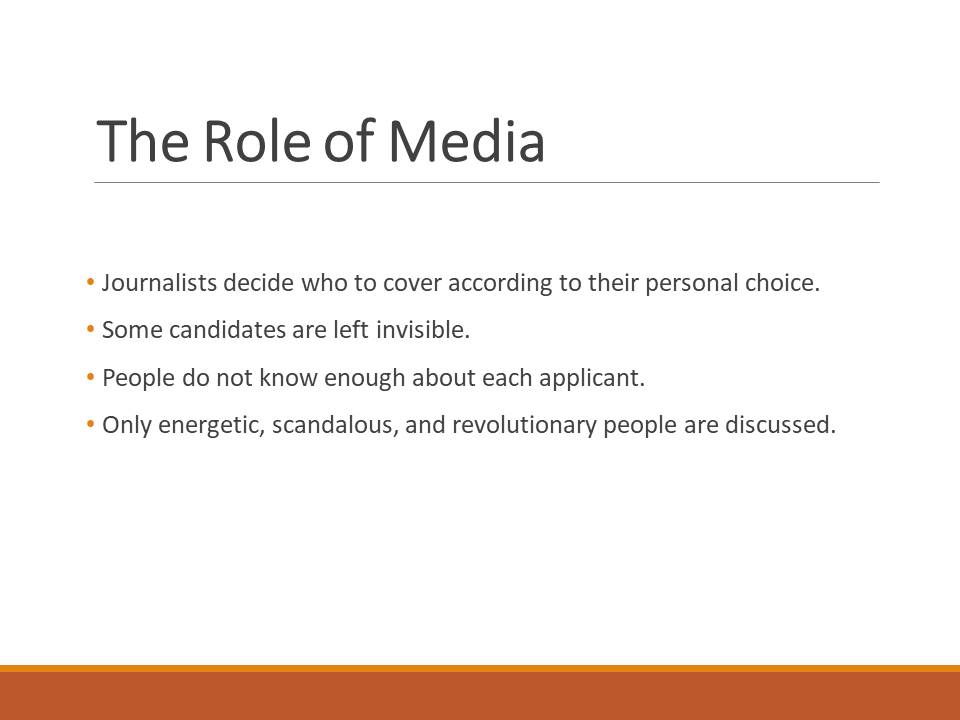
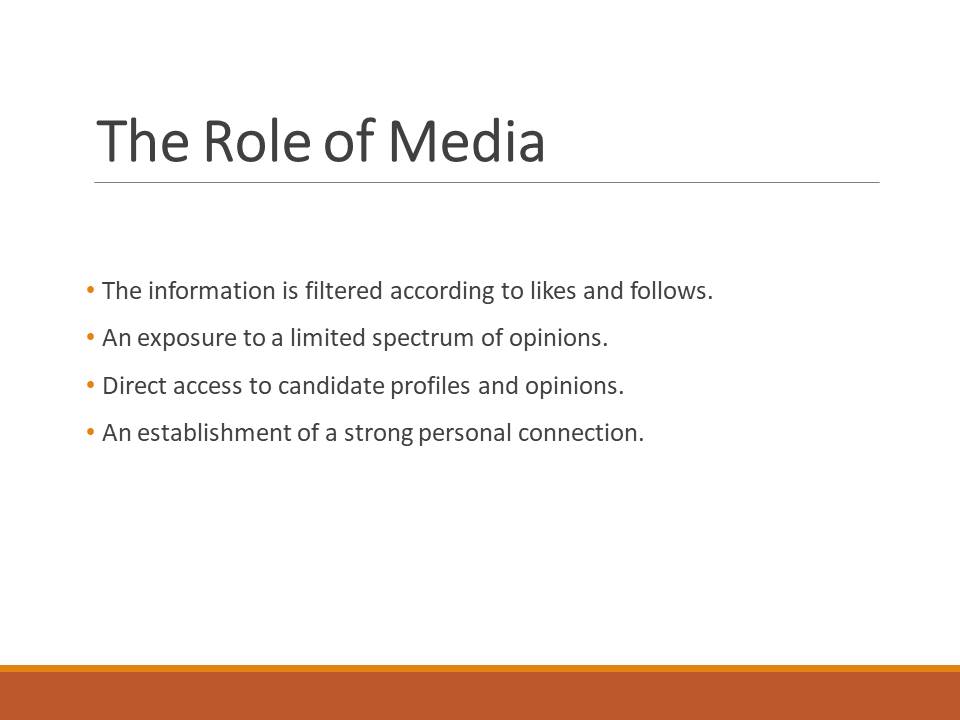
The Role of Money
- A vital element of a political campaign.
- A proper representation in front of the public.
- Covers transportation, advertising, political consulting.
- Mostly private funds; public money available for president candidates.
- Helps rich people and harms the poor.
- Not a deciding factor in political elections.
- An advantage in addition to other possibilities.
Money is another essential part of any political campaign. Without the existence of large funds, applicants cannot accurately present themselves to the general public and contribute to the positive outcome of the elections. It is necessary to mention that most of the political campaigns have to be financed privately; however, public funds are available for the presidential candidates both during primary and general elections (Bugh, 2016). Political campaigns include many expenditures, such as advertising, transportation, political consulting, communication with voters through social media (Bugh, 2016). Consequently, money is a critical part of an election process as it ensures an effective result of the campaign.
Since money is essential for the election process, it can help some of the wealthiest individuals significantly and, at the same time, put others in an unfavorable position. This phenomenon exists primarily because candidates with the biggest funds have millions of possibilities to be active in their campaigns and ensure coverage on social media. For this reason, they may leave out other applicants who have less financial possibilities. On the other hand, it is proved that money is not a deciding factor when it comes to political elections (Bugh, 2016). Finances are definitely a huge advantage, but a valid program, knowledge, and impactful communication with the voters are some of the more important elements.
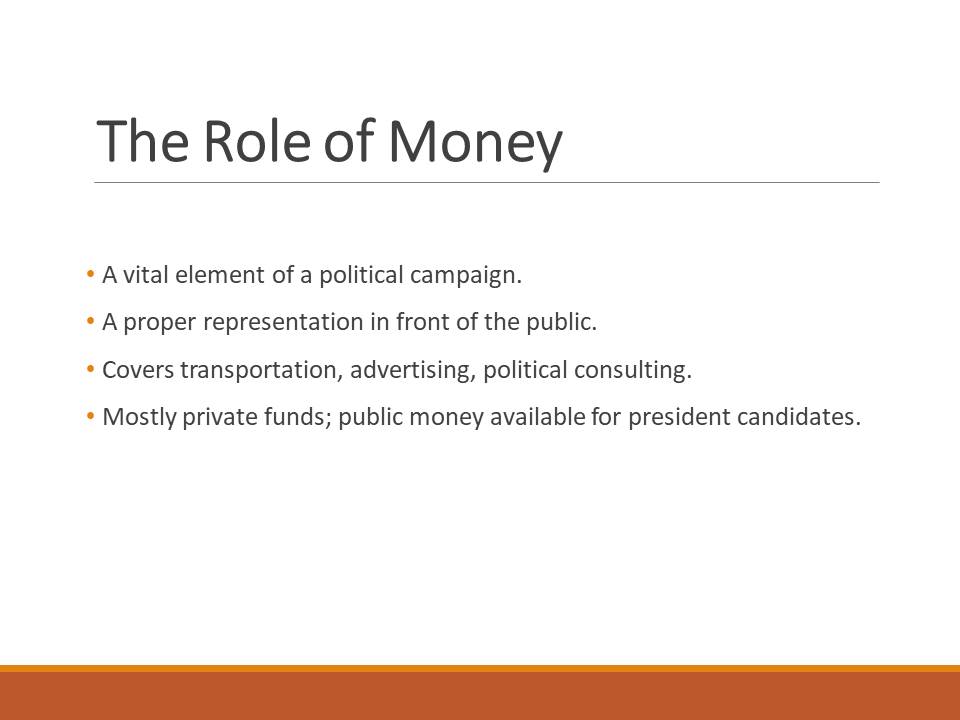
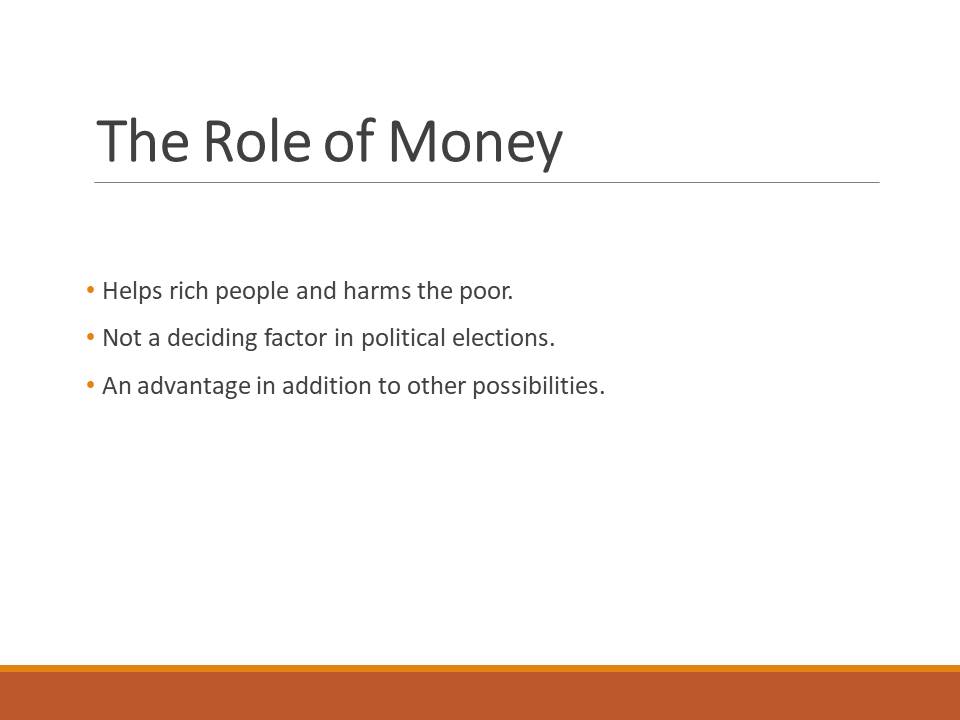
Conclusion
Overall, the following presentation proved that the U.S. electoral system is complex and consists of several crucial details. Even though many people refer to the whole process as the Electoral College, there are many elements that are necessary to happen before that. Some of the practices included in the voting process are primary elections and caucuses, national conventions, political campaigns on social media and television, general elections, and debates. Individuals from the general public can also be highly involved in the process by promoting desired candidates, spreading awareness, and participating in general elections. In addition, the media and finances play an essential role in any political campaign and can even influence the outcome of the elections. Therefore, in order to understand the whole system better, the presentation discussed all the mentioned aspects in more depth.
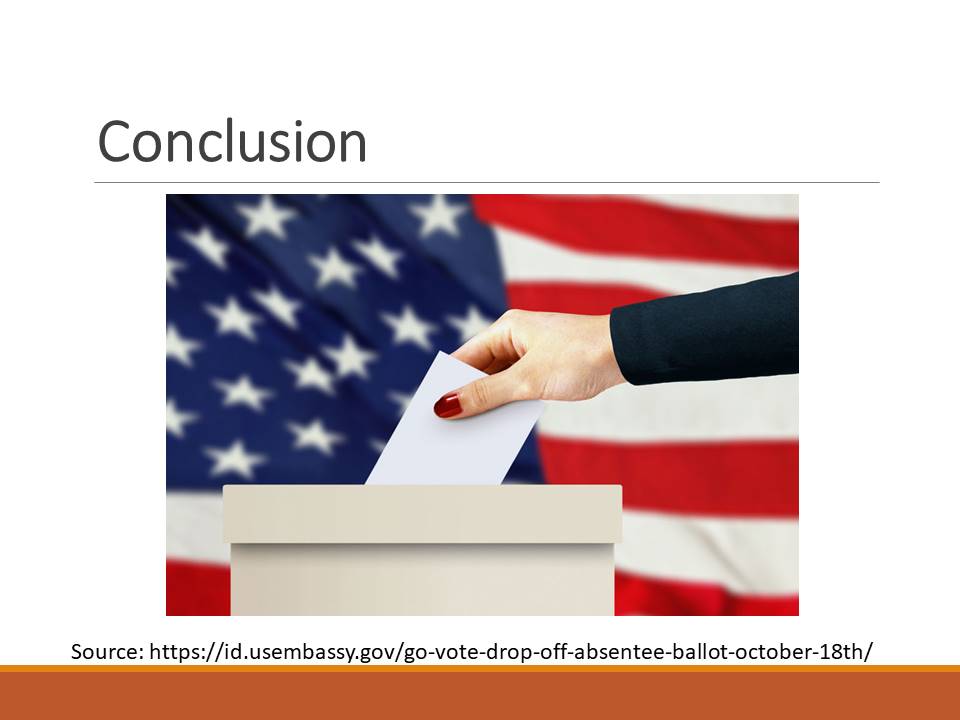
References
Berman, L. (2016). What actually happens at the U.S. presidential conventions. The Atlantic. Web.
Brichacek, A. (n.d.). Six ways the media influence elections. University of Oregon. Web.
Bugh, G. (Ed.). (2016). Electoral College reform: Challenges and possibilities. Routledge.
Primaries and caucuses. (n.d.). Bill of Rights Institute. Web.